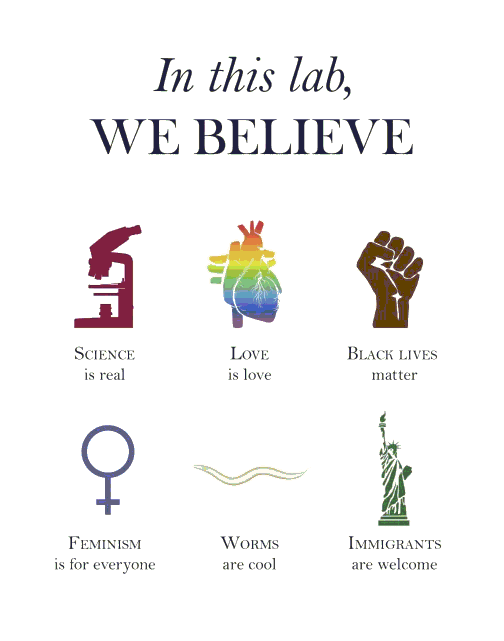

The Vega lab is a diverse group of scientists of different races, ethnicities, socio-economic and intellectual backgrounds, sexual orientations, genders, nationalities, abilities, religious affiliations and life stages. We believe that our diversity is a strength, and we are committed to supporting the diverse population of scientists here at Emory and beyond.
In our group at Emory, we work to foster a respectful, inclusive, supportive environment where scientists from all walks of life can prosper. We strive to honor the diversity of our labmates and our broader community, to discover the things that we have in common, and to celebrate our differences. Our lab philosophy is based on the principle that we are all deserving of dignity and respect as human beings and as individuals, and that this principal should guide our interactions with one another. In pursuit of this principal, we commit to:
Mentorship
- Listening to one another and to our communities, to better understand the issues faced by individuals from different backgrounds at different points in their scientific and academic experience
- Recruiting and mentoring diverse trainees in ways that are supportive of their individual needs
- Establishing a safe and inclusive training environment where individuals can bring their whole selves, and where differences in experience and perspective are acknowledged and valued
- Treating each other with acceptance and compassion
- Accommodating individuals’ specific needs, such as flexibility in work schedules, and promoting sustainable and healthy work-life balance
- Promoting accessibility for researchers living with disability and chronic illness
Teaching
- Highlighting, through our teaching, the work of scientists from diverse backgrounds
- Including the human dimension of science by talking about and depicting the researchers behind the advances that shaped our field(s)
- Explicitly acknowledging the current and historical biases and prejudices in science, especially when those prejudices are distasteful or uncomfortable to consider
Outreach
- Leveraging our location within the heart of Atlanta to target outreach towards community members from backgrounds underrepresented in STEM
- Expanding outreach efforts to local under-represented populations at the K-12 level, to spark interest in STEM
- Creating community partnerships to welcome students from socio-economically disadvantaged and underrepresented backgrounds by:
- Reaching out to recruit students from local minority serving institutions and via listservs such as SACNAS
- Having an undergraduate application process for lab research that highlights our diversity and inclusivity
Decolonizing Science
- Listening to, amplifying the work of, and advocating for diverse trainees and peers
- Acting against racist and oppressive words, actions, and power struggles in the lab and beyond
- Continuing to educate ourselves on diversity, equity and inclusion by:
- Setting aside lab meetings for DEI education and discussion
- Leading education efforts in the Biology departments and the training programs with which we are associated
- Advocating for the hiring of diverse faculty
- Learning from our mistakes